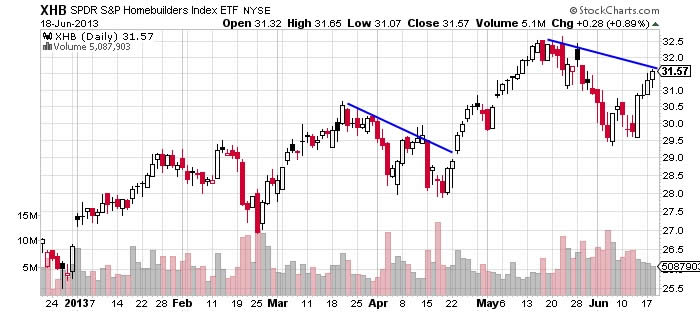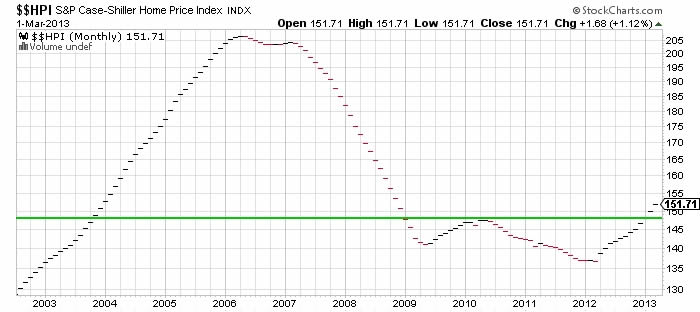Did the Federal Reserve Just Kill the U.S. Housing Market Recovery?
Housing-Market / US Housing Jun 21, 2013 - 06:42 PM GMT George Leong writes: Get ready folks, the party in the housing market may be drawing to a close. Sure, the housing market has steadily improved—you can thank the Federal Reserve for that. But nothing lasts forever.
George Leong writes: Get ready folks, the party in the housing market may be drawing to a close. Sure, the housing market has steadily improved—you can thank the Federal Reserve for that. But nothing lasts forever.
Just take a look at the steady rise in the 30-year fixed-rate mortgage rates after Federal Reserve Chairman Ben Bernanke suggested he might have to reduce his monthly bond buying—buying that helped to drive down lower-term financing rates.
Of course, by the time you read this, it’s likely that we all will know what the Fed has decided to do.
According to the Mortgage Bankers Association (MBA), the average contract interest rate for 30-year fixed-rate mortgages was at 4.17% for the week of June 14—marking the highest level since March 2012 and the sixth consecutive week of higher rates. (Source: “Weekly Application Survey,” Mortgage Bankers Association web site, June 12, 2013, last accessed June 20, 2013.)
Now we are seeing a rise in home mortgage applications, up five percent week-over-week, according to the MBA. Yet, driving the demand is clearly a rush of applicants who want to lock in the low mortgage rates in the housing market, fearing interest rates will inevitably move higher. The refinance demand is similar. The rise in applicants doesn’t necessarily mean home sales, but simply a move to try to lock in rates.
In the housing market, there’s some evidence of stalling, but the speculation is that the homebuilders that have done really well have decided to hold off on the flow of homes in order to cash in on the higher home prices that are currently available.
In May, housing starts came in at an annualized 914,000 units, which was below the Briefing.com estimate of 925,000, but above the 856,000 in April. Building permits came in at an annualized 974,000, in line with Briefing.com estimates, but falling short of the more than one million in April.
I’m not saying that the housing market is set for a collapse, but the easy money available in that sector may have already been made.
The chart of the S&P Homebuilders Index below shows the current situation and the possibility that the index could ratchet higher from here; and that is exactly what happened in late March to April when a similar pattern surfaced on the chart, according to my technical analysis. My thinking is that the index could spike higher if the Fed decides to continue to print money and to keep rates low longer.

Chart courtesy of www.StockCharts.com
The reality is that home prices have been moving higher. The average prices in the top-20 housing markets nationwide surged to 10.9% in March, according to the S&P/Case-Shiller Home Price Index, featured below. It was the 14th straight up month for prices in the housing market, as reflected in the chart below.

Chart courtesy of www.StockCharts.com
So, it really comes down to the Fed. My opinion is that Bernanke must carefully weigh the upward move in the housing market and the stock market against the ramifications of allowing the easy money to continue flowing.
The jobs market still needs to come around, which is likely the main dilemma facing the Fed. The risk is that if the Fed doesn’t ease off soon, the easy money could cause more havoc down the road not only in the housing market, but also in the massive buildup of debt accumulated during the low-interest-rate years.
This article Did the Federal Reserve Just Kill the Housing Recovery? was originally published at Investment Contrarians
By George Leong, BA, B. Comm.
www.investmentcontrarians.com
Investment Contrarians is our daily financial e-letter dedicated to helping investors make money by going against the “herd mentality.”
George Leong, B. Comm. is a Senior Editor at Lombardi Financial, and has been involved in analyzing the stock markets for two decades where he employs both fundamental and technical analysis. His overall market timing and trading knowledge is extensive in the areas of small-cap research and option trading. George is the editor of several of Lombardi’s popular financial newsletters, including The China Letter, Special Situations, and Obscene Profits, among others. He has written technical and fundamental columns for numerous stock market news web sites, and he is the author of Quick Wealth Options Strategy and Mastering 7 Proven Options Strategies. Prior to starting with Lombardi Financial, George was employed as a financial analyst with Globe Information Services. See George Leong Article Archives
Copyright © 2013 Investment Contrarians- All Rights Reserved Disclaimer: The above is a matter of opinion provided for general information purposes only and is not intended as investment advice. Information and analysis above are derived from sources and utilising methods believed to be reliable, but we cannot accept responsibility for any losses you may incur as a result of this analysis. Individuals should consult with their personal financial advisors.
Investment Contrarians Archive |
© 2005-2022 http://www.MarketOracle.co.uk - The Market Oracle is a FREE Daily Financial Markets Analysis & Forecasting online publication.



